INTELLIGENCE
CELEBRATING EMERGING HISTORY
INROADS FEATURE IN ESSENCE MAGAZINE
STRAIGHT OUT OF COMPTON:
INROADS ALUMNUS ANTHONY D. MAYS LIGHTS THE WAY FOR THE NEXT GENERATION OF TECH TALENT

Our Past Events
Our Future Events









INROADS FEATURE IN ESSENCE MAGAZINE
STRAIGHT OUT OF COMPTON:
INROADS ALUMNUS ANTHONY D. MAYS LIGHTS THE WAY FOR THE NEXT GENERATION OF TECH TALENT

Our Past Events








The journey to get where INROADS Alumnus Anthony D. Mays is today wasn’t easy. Born in Compton and raised in foster homes after suffering abuse, he has overcome many challenges and roadblocks. Anthony persevered through sheer tenacity and inner strength drawn from mentors and support networks, including INROADS, which turned out to be a pivotal experience that changed the trajectory of his life.
After spending eight years as one of only a handful of Blacks in a very coveted software engineer position at Google, Anthony left to pursue full-time entrepreneurship as founder of Morgan Latimer Consulting. He is also partnering with Karat’s Brilliant Black Minds initiative, backed by tennis champion Serena Williams, and focused on doubling the number of Black engineers in tech. His goal is to bridge the gap between the underrepresented and companies looking to hire exceptional talent.
As a speaker and career coach, he excels at weaving his inspirational story of perseverance into rich, thought-provoking conversations about inclusion in tech, employing candor, humor, and vulnerability to reach both minds and hearts. Anthony shared his story with us, describing how his passion for computers and desire to create a more inclusive tech industry motivated him to keep going.
Tell us a little bit about your life growing up. I grew up in Compton, California, as a foster kid. A kindergarten teacher discovered that I had been a victim of physical and sexual abuse and I ended up going through the foster care system. I got separated from my two younger brothers, who went to their own group homes, and I was moved among different foster homes several times. Fortunately, we were eventually brought together under one roof, so we were able to grow up together as a family.
The years prior to college were an interesting time in life for me as I wondered about what I wanted my life to be and where I wanted to go. I came upon this idea that computers and technology might be a path forward.


“So, I taught myself how to code when I was eight years old on a toy computer.”
At eight years old, you had an aha moment that “computers are for me.” How did that happen at such a young age?

Many of the cartoons and TV shows I watched as a kid featured computers prominently as a gimmick or MacGuffin. I fondly remember things like the batcomputer. (I often joke that Batman was the blackest person that I saw on TV using computers.) So, I wanted to build my own bat-computer.
Everybody knows Batman doesn’t have superpowers. His ability comes from his strength, intelligence, and the tools he has at his disposal. I thought computers granted me a kind of superpower. If I could learn and figure out how to use them, I felt powerful. Learning how to build and conceptualize things in code gave me a feeling of control and agency.

As a foster kid who had lost all sense of control, having had my entire family ripped apart from me at one point, having control over something in my life meant everything. Computers gave me that.
How did you continue building your knowledge about computers?

At first it was a frustrating journey because I wanted to move beyond the toy. I needed resources, training, and teaching to help me understand this larger world of computers. Unfortunately, though, being in Compton, I felt like the city was a real information desert. This is before the internet had really taken off. So, I had to rely on the local library, which had books that were a decade old. Even with the books, I didn’t have the tools to implement exercises and continue this self-teaching journey. At one point, I even gave up on coding.
Fortunately, I had a computer lab instructor in middle school and a computer lab administrator in high school, both of whom mentored me through those school years, teaching me things about computers. They taught me everything about how the internet works, including what “www” means, how to build, run, and administer a computer, and how to work with network cables. I had the opportunity to volunteer at local schools in the L.A. area to sharpen my skills and gain experience. By the time I encountered the INROADS program, I was well on my way to starting a career in this space. I was just looking for the first opportunity for this Compton kid to show what more he could do.
How were you introduced to INROADS and what impact did it have on your career?
I didn’t find INROADS, INROADS found me. I was walking around my college campus at lunch and encountered a room where a gentleman by the name of Bryan Barnes was meeting with some fellow students. He sees me at the door, invites me in, and asked me if I wanted a career. He was asking a Black kid from the hood if he wanted a career, and I said, “Yeah, I want a job! I want a career.” The idea of a career was especially attractive because I knew there was a difference between a job and a career. So, I sat in on the INROADS information session and I signed up. My parents were also very keen to keep their eyes open for every opportunity that presented itself, considering the meager education opportunities that we had in Compton. When INROADS came along, I knew that I needed to think about it as a rare opportunity to do something different, so I joined the program. I was pleasantly surprised to be offered a software internship with City National Bank through INROADS, where I built a fruitful and productive mentoring relationship with my boss.

Did you encounter any barriers while building your career in tech?


It’s interesting to think about it. The corporate world is not just this place where I can build a career and earn an income, but it’s also a place that is hostile to people who look like me, and who come from where I come from. There was trepidation and fear on my part, and a great sense of caution, and even paranoia, about who I’m working with and whether they have my best interest at heart.

My goal was to fit in as much as I possibly could. Therefore, there was this learning process of gaining the knowledge to succeed on the job, but then also fitting into this new culture and new style of working with people of varying ages. I was the youngest person on the floor being surrounded by adults who had gone to college and had their own families. I was constantly comparing myself to other people. I always saw myself as not being where they are, and I wanted to do whatever I could to catch up. This motivated me to move forward.
We call it “impostor syndrome” in the industry. Even to this day, I continue to struggle with that, but INROADS armed me with the knowledge that I needed to work hard but I could also lead.
INROADS taught me how to be inquisitive and to take ownership of my own learning. So, even if no one was around to teach me in the moment, I would know how to pull in resources and ask questions to excel. Because of that training and excelling in my summer internships, I received the INROADS Lorenz Tovar “Intern of the Year” award for exemplary corporate and community service as an intern.

You’ve had incredible success, including achieving a position in Google. Can you tell us about that experience?
After about a decade of building my career at City National Bank, Junction Solutions, and Slalom Consulting, a big thing happened in 2011. I had the opportunity to interview with Google, which is everybody’s dream company. I took the chance, did the interview, and I failed. That was a hard time to endure. I felt like I had let down myself and all Black people everywhere. I felt I had let down my church, my community, and my family. It felt like I had reached the ceiling – the glass ceiling.
It took people investing in me, believing in me, and encouraging me to try again. I endured the interview process again and successfully won an offer. A lot of what I needed to be at Google, I learned from my formative years and in the INROADS program.

What are two highlights from your career that you are most proud of?
One highlight I’m most proud of was being named on the patent for banking technology while I worked at City National Bank as a full-time employee. I remember that it meant so much to me because I grew up inspired by Black innovators of the past, and I couldn’t find or see those Black innovators in the present. I was inspired by people like Garrett A. Morgan and Lewis H. Latimer, after whom my own company is named now. The fact that these were patented inventors who innovated during times of slavery, Jim Crow, and the mass lynching of Black people became my inspiration. Because of their example, I felt that I too could become a patented inventor, so, when that happened it was very, very meaningful to me and a validation that I was heading in the right direction.

The second most meaningful moment was passing the Google interview. Getting a job at Google is one of the hardest things to accomplish and it is one of the most coveted roles in the tech world. Being able to ascend that high in my career felt like such an important validation. I accomplished something as rare as coming up as a foster kid in the hood and becoming a software engineer at Google. That story continues to inspire people all around the world and, for me, it’s an honor to be able to say that I accomplished that.
Finally, what is one piece of advice you would give to a student?
Take every risk you can and don’t be afraid to succeed.



With 2023 already in full swing, INROADS is well into executing our programs, and starting new initiatives thanks to the support of our staff, alumni, friends, students, partners, and our National Board.
We hope you enjoy reading about all that is going on at INROADS and that it inspires you to get involved to create an impact for the leaders of tomorrow.
INROADS is happy to announce that we will have our annual Benefit Gala May 3, 2023. This will be an in-person, blacktie fundraising event in Washington, DC, where we recognize visionaries and leaders who mirror the legacy of our founder, Father Frank C. Carr.
Visit INROADS.org to RSVP for this event, to donate, and stay connected with INROADS. Together, let’s create opportunity, impact, and change lives for years to come.
Sincerely,
Forest T. Harper, Jr. CEO & President, INROADS





The INROADS paid internship program is helping level the corporate playing field


AS SEEN IN WAYMAKER
MAGAZINE PUBLISHED SUMMER 2022
Interview with Forest T. Harper, Jr., President & CEO of INROADSStudent internships may be a proven foot-in-thedoor career advancer for young people starting out their working lives, but many can’t afford to put in all those hours for free, as most such opportunities require. That’s where INROADS is making a difference, providing paid internship opportunities for underserved minority communities. For more than 50 years, the nonprofit — founded by a white businessman unhappy with the inequities he saw in corporate America — has helped diverse students develop their skills to make the most of what can be life-changing placements.
From modest beginnings — starting with 25 interns and 17 sponsoring organizations — INROADS has grown into the leading organization of its kind. Each year around 1,500 students secure internships at some 200 sponsoring businesses, including leading Fortune 500 companies. The INROADS 30,000 alumni include top business leaders like Thasunda Brown Duckett, the CEO of Teachers Insurance and Annuity Association of America and one of only two African American females leading a Fortune 100 company. But the success of INROADS is not only to be seen in corporate boardrooms but in personal bank accounts: 76% of alumni are homeowners while 40% have family assets between $500,000 and $5 million.

That’s very different from the norm. INROADS cites 71% of whites being homeowners compared to 45% of Hispanics/Latinos and 41% of Blacks. Meanwhile, the average net worth of a white family stands at $171,000. For Latino/Hispanic families it is $21,000 and for Black families just over $17,000.
“We’ve known this all along,” explains INROADS President and CEO Forest T. Harper, “that a paid internship actually starts you off with good economic balance.” It starts with being rewarded for your skills, then leads to full-time employment possibilities, which bring with them benefits, bonuses, 401(k) plans. “They begin to get on the economic train for mobility and to higher income,” says Harper, “and that’s why internships pave the way to economic independence by starting off with paid internships.”
INROADS internships are intended for undergraduate students in a four-year college or community college. Anyone with a 2.8 GPA can apply for a spot (www. INROADS.org) and the application is free. However, acceptance is not a shoo-in. Nor is an internship; INROADS sends two candidates for each opportunity.
“They get to compete for that one role, and it should be that way,” Harper says. “We want you to put your best foot forward ... it’s not guaranteed. Nobody makes a promise. You have to go out and earn it just like you
would in sports, just like with anything else ... it’s highly competitive.”
INROADS programs aim to help prepare students for their interviews and then support them through the internship experience. They are required to complete mock interviews to get used to presenting themselves professionally and showcasing their problem-solving abilities.
INROADS calls the abilities it wants students to develop “power skills,” not soft skills as many people refer to them. “Like the Power Rangers, right?” says Harper. “If you get these skills, you can do just about any job, no matter what the specialty is.”
The fallout of the coronavirus pandemic hit minority communities disproportionately hard, leaving some of their young people wondering whether it’s really worth the financial struggle of pursuing further education.
Opportunities like those with INROADS are still worth pursuing. “First of all, there are really two key things that you want to have as a human being,” Harper adds. “You want to have access and opportunity, equal to you just like anybody else. Unfortunately, the playing field is not level for you. It’s not, let’s be realistic about this. You can have as much talent as you want, but education gives you a chance to get up to bat.”
Echoing the INROADS founder’s sense of calling, Harper describes his work there as “not a job. This is ministry for me, because it’s about my purpose.” When he speaks about the possibilities for young people to overcome adversity, he’s not just talking about the success stories of INROADS, but from personal experience.
Then one day, says Harper, “I looked in the mirror and I said to myself, ‘Forest, there’s nothing you can do about being the first, but there’s always something you can do about being the only.’ So, from that point on my purpose became: I’ve got to make sure I help others, not just be the only, but be more.”
More businesses have been talking about improving opportunities and access for minorities in the past couple of years. Harper welcomes how businesses have increased minority hiring at the pipeline level.
“Now that’s a good start, corporate America, but guess what? Let’s see you finish it. And what that means is, let’s now hire them. We’ve seen the spending; we’ve seen the commitment. Now let’s go through with the hiring, and we’ll see that in a couple of years.” Harper said.

“Boeing is proud to once again partner with INROADS and looks forward to all that we will accomplish together into 2024. Our support of its College Links program means that more students gain access to business skills development, mentoring, and more to help propel them into successful careers. And some of those students, like me, have found amazing careers at Boeing,” said Allen, Chief IT & Operations Officer.


“I’m proud to work for a company that is not only making strides to create an increasingly more diverse workplace but also invests in preparing a more diverse workforce for the future.”
 Niki Allen
Niki Allen




INROADS was grateful to participate in the Denver Nuggets game on Feb. 7, 2023, as part of their Black History Month celebration. The Nuggets’ generous contribution of a suite enabled INROADS to celebrate the accomplishments of Black historymakers and introduce supporters to the work we will do in collaboration with the NBA as we expand into the Denver market.

The NBA Foundation granted almost $1 million to boost Utah’s Black community during NBA All-Star Weekend hosted Feb. 17 – 19 in Salt Lake City, Utah. The funds will be used for a number of initiatives focused on Utah’s Black community, including helping low-income and diverse high school and college students. INROADS was honored to be one of six grantees receiving the funding. INROADS also hosted an HBCU Career Development Workshop alongside the NBA during the weekend.

 INROADS alumni, staff, and supporters gather during the Denver Nuggets vs. Minnesota Timberwolves game on Feb. 7
Live broadcast of INROADS President & CEO Forest T. Harper, Jr.
INROADS on the Jumbotron Aerial view of the game
INROADS alumni, staff, and supporters gather during the Denver Nuggets vs. Minnesota Timberwolves game on Feb. 7
Live broadcast of INROADS President & CEO Forest T. Harper, Jr.
INROADS on the Jumbotron Aerial view of the game










INROADS COLLEGE LINKS TO LAUNCH IN SAN ANTONIO WITH USAA SUPPORT
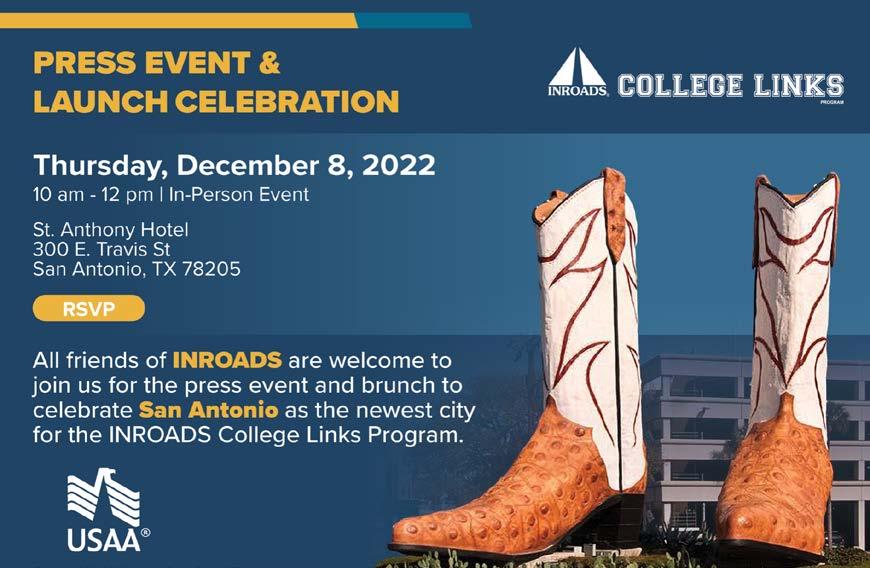
ATLANTA, GA (DECEMBER 5, 2022) —The INROADS
College Links program is launching in San Antonio, Texas, to prepare local high school students for college and career success. USAA will sponsor the San Antonio program, which will provide underserved high school students in the region with critical STEM and business training, mentoring, and skills development. Read more…
INROADS WELCOMES BEVERLY PORTER AS THE NEW CHIEF PROGRAMS OFFICER

ATLANTA, GA (January 31, 2023) — INROADS
welcomes Beverly “Bev” Porter as its new Chief Programs Officer. Bev will lead and oversee INROADS programs, services, and initiatives designed to improve educational and career outcomes for students and entry- to mid-level professionals across the nation. Read more…
INROADS WELCOMES DRAY

YARBROUGH AS ITS FIRST CHIEF TECHNOLOGY OFFICER
ATLANTA, GA (February 16, 2023) — INROADS
welcomes Dray Yarbrough as its new Chief Technology Officer. Dray will be responsible for the integration and unification of the INROADS experience, with the focus on scaling the programs of INROADS to be able to reach more lives in a larger geographic footprint. Read more…

SALT LAKE CITY — All-Star Weekend may be over, but the NBA Foundation left behind almost $1 million to boost Utah’s Black community.

The $1 million comes in the form of a series of grants for both local nonprofits and national nonprofits with a presence in the state. The funds will be used for a number of initiatives focused on Utah’s Black community, ranging from mental health to student success. Read more…

ATLANTA, GA (April 13, 2023) —Patrice Graves, a Global Chief Human Resources Executive, joins the INROADS National Board of Directors. Patrice has over 20 years of experience in diverse industries, including technology and services, aerospace & defense, insurance, and civil engineering. She has led human resources and corporate security functions globally to nurture culture change, build high-performing teams, and enhance employee experiences. Read more…

presented by

HOST AND MASTER OF CEREMONIES Host of “SYMONE” on MSNBC
Symone Sanders-Townsend

BREAKING BARRIERS AND MAKING HISTORY
WEDNESDAY Union Station, Washington, D.C.
May 3, 2023 6:30 P.M.

INROADS.org/BenefitGala

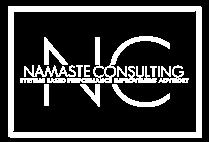




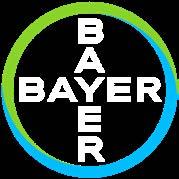







PRESENTED BY:
Patrice and Keron Graves





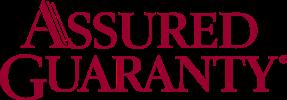





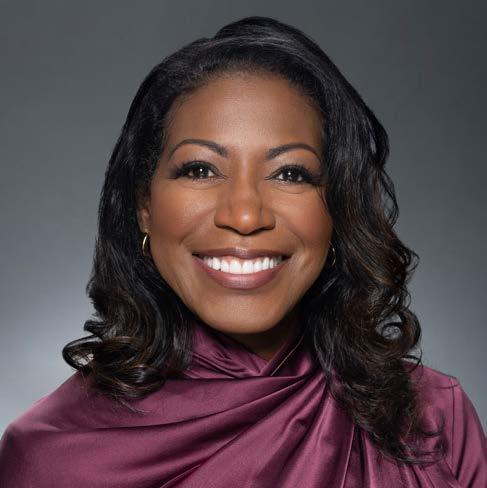 ALUMNI OF THE YEAR AWARD
Sekou Kaalund Executive Vice President, U.S. Bank
ALUMNI OF THE YEAR AWARD
Sekou Kaalund Executive Vice President, U.S. Bank




 Tirrell
Tirrell




Working Gen Z employees are among the least satisfied group in today’s workforce. MetLife’s 2022 Employment Benefit Trends Study (EBTS) found that job satisfaction and loyalty are disproportionately low among Gen Z compared to other generations, but purposeful work is a top driver for overall employee health and well-being. This gives organizations a chance to help younger generations feel a stronger sense of belonging early on, by embedding impactful work into internship programs.
As a member of the National Board of Directors for INROADS Inc., a national nonprofit organization dedicated to developing and placing underserved youth in business and preparing them for leadership, I’ve learned firsthand how purposeful work can lead to higher satisfaction among interns, resulting in more satisfied future employees. MetLife and INROADS have a long-standing partnership and have worked together to create pathways for nearly 900 students. Last summer, MetLife welcomed 12 INROADS interns, most of whom were hired full time. We’re aiming to triple the number of interns this year because of the outstanding success of the program.

Pulling from our own experience, I’d like to share tips to transform experiences for interns:
Merrilee Matchett is an INROADS National Board Member and the Executive Vice President and Head of Global Customer Service and Operations at MetLife. In this role, she directs a team of more than 10,000 people responsible for managing the operations and servicing teams that support and enable the U.S. Group Benefits, Retirement & Income Solutions, MetLife Holdings, and Asia, EMEA, and LATAM businesses across more than 40 global markets.

1. REAL EXPERIENCES: Instilling responsibility and accountability for interns at all stages can help establish a sense of belonging and purpose. At MetLife, our interns are entrusted with important responsibilities, supported by our teams, and always have a seat at the table to help tackle real business problems.
For example, our recent summer interns worked across various departments, met with senior leaders, including our CEO, Michel Khalaf, participated in lunch & learns, and contributed to key business projects. One intern created an entire microsite for our organization from scratch, another created a design toolkit and assets for internal campaigns, and a third created and implemented a tool that captures & tracks customer health status.

2. MENTORSHIP: Mentors and peer networks are another crucial element of successful internship programs. Giving interns a chance to connect professionally and socially to deepen their network, expand skill sets, and build a valuable network of peers and mentors is integral to a successful program.
The summer 2022 INROADS interns at MetLife each had a chance to present to senior leaders across the organization, building their networks and their confidence.

3. FEEDBACK LOOPS: It’s important to create communication pathways where interns feel comfortable providing honest feedback on their experiences and the ways in which organizers can improve their programs. HR leaders should work in tandem with intern coordinators to help ensure that interns feel heard, valued, and supported throughout their experiences. Equally important is providing consistent feedback to interns to help them grow and develop in the ways most important to them. For example, establishing a steady cadence of check-ins with managers and/or program leaders to review strengths and areas of growth can help maximize the importance of feedback.
Investing in your people is a key driver in cultivating a contemporary workforce, and that can begin by creating lasting, impactful experiences for interns. Companies that strive to make a positive impact on their associates early in their career journey will find the most success in creating diverse talent pipelines with high job satisfaction and loyalty. As someone who is passionate about supporting upcoming generations of talent, I’m proud to be part of MetLife and INROADS, two incredible organizations that are investing in future generations and shaping the leaders of tomorrow.
THE SKEPTICISM OF BLACK COMMUNITIES IS NOT WITHOUT MERIT, BUT HARPER EXPLAINS WHY HE IS STILL CONVINCED THE SUMMER OF 2020 WAS THE DEIB GAME-CHANGER IT PROMISED TO BE.
Capitalism isn’t the boogeyman; it’s the way of American business. However, the system does demand hard choices. No matter the sector, every company is ultimately in business to produce one thing — profit. Whether industry leaders subscribe to stakeholder capitalism, shareholder capitalism, or conscious capitalism, the business of business comes down to capital. So, in times of economic uncertainty, spending that contributes to the bottom line is prioritized, and that which doesn’t, isn’t.
The problem is hard choices often come with ugly consequences, and in times of economic headwinds, diversity initiatives frequently end up on the chopping block. Still, the necessity of capitalism doesn’t compensate for a history of structural discrimination. Deprioritizing promised DEIB (diversity, equity, inclusion, and belonging) commitments puts more at risk than just the bottom line. It calls into public question the sincerity of such commitments.
Corporate America’s teetering on DEIB commitments frays an already tattered relationship with historically marginalized communities. For the tech industry in particular, the deterioration of trust is justified. Listings for DEIB roles declined 19% in 2022, and mass layoffs have sometimes wiped out entire D&I departments — all of which undermine pledges made by the sector to boost underrepresented

https://www.essence.com/news/dei-commitments-inroads-ceo/

talent in its leadership ranks. As large swaths of big tech render their corporate diversity promises all talk and no action, it calls into question the credibility of commitments across all industries. But Forest T. Harper, President and CEO of INROADS, says, not so fast.
Harper — who heads the nation’s largest nonprofit feeder of diverse talent into corporations — says the cynicism of Black and brown communities is not without merit. Still, he has 7 billion reasons to believe that the summer of 2020 was the DEIB game-changer it promised to be. According to a new McKinsey report, corporate America has topped over $7 billion in DEIB-related efforts since the unjust murder of George Floyd. Public commitments project more than $15.4 billion in spending by 2026. For Harper, it’s just one of many data points that bolster his confidence.
“What we saw in 2020 after the unfortunate deaths of George Floyd, Breonna Taylor, and Ahmaud Arbery was unprecedented [in terms of corporate diversity commitments]. Number one, the three- to five-year plans were made public. That’s the first indicator that corporate America has gotten serious. The second is they were funded, go to the McKinsey data, the commitments were legit,” Harper told ESSENCE. “It’s the first time we have seen such mass, analytical, legitimate tracking to an accountable number, made in public,” he said.
While significant investments in corporate diversity initiatives demonstrate good faith, the impact of that spending has yet to be seen. Harper said that’s to be expected. “A pivot of this magnitude happens over multi-years,” he said. His confidence in corporate commitments to DEIB is not only informed by data. As a strategic partner building diverse talent pipelines into several Fortune 500 companies, his purview behind the corporate curtain provides added insight.
I asked the INROADS leader and Forbes Nonprofit Council member to lend some perspective on the state of corporate diversity. He shared why corporate America has to address DEIB from the inside out if they want to see results, what is required of organizations to make the necessary cultural shift, and how INROADS is partnering with top companies to support the transition. Harper also revealed why he believes now is the opportune time to significantly narrow — maybe even close — the racial wealth gap.


CORPORATE AMERICA’S
Diversity makes dollars and sense for corporations. Organizational diversity is correlated with better financial performance, and what’s more, the public is increasingly holding businesses to account by choosing to spend with companies that demonstrate a commitment to social responsibility. In more ways than one, corporate investments in diversity, equity, inclusion, and belonging contribute to organizational bottom lines. Still, despite the proven competitive advantage given to diverse organizations, the implementation of diversity initiatives is often tricky to embed within organizations.
As it turns out, policy is easier to change than hearts and minds. The reality is businesses are staffed with people, some of whom may resent all the hoopla around diversity, equity, and inclusion. Personal biases — consciously or unconsciously — factor into hiring decisions, advocacy choices, and the overall treatment of people of color within organizations.
Harper says internal pushback is often to blame for the disconnect between DEIB commitments made at the corporate level and their often lackluster implementation. “They [organizational leaders] found out they have to fix the inside first,” he said. “If you don’t fix the inside — meaning your current state of promotions, your current state of retention, your intern converts, equal pay for women — results will be delayed.” Harper says changing organizational culture is difficult but not impossible. “The shift requires disrupters willing to challenge corporate social norms,” Harper said.
“
If you don’t fix the inside — meaning your current state of promotions, your current state of retention, your intern converts, equal pay for women — results will be delayed.” -Harper
Capitalism isn’t in the business of charity, and Black and Hispanic people aren’t looking for a handout. Investments in cultivating diverse talent aren’t discriminatory — on the contrary, it’s the history of structural discrimination that makes such deliberate investments necessary. Harper, a former senior-level executive of an S&P 500, understands the nuances of business leadership. He also understands the necessity of disruption. The INROADS organization he now helms was founded on it.
For Frank C. Carr, the visionary who founded INROADS in 1970, the organization completely disrupted his life. “This was a stately white gentleman out of the class in 1944. He was a corporate executive, well respected in his community. But, he decided to take some kids on a school bus to The March on Washington. After hearing Dr. Martin Luther King speak, he came back and created INROADS because he wanted to disrupt the norm. He wanted to create inroads for Blacks and Hispanics to enter corporate America, and the middle class,” Harper shared. INROADS is still in the business of disruption. Companies, including Lockheed Martin, PricewaterhouseCoopers, and Pepsi Beverages Company, partner with the nonprofit and embrace its elite pool of diverse talent. Some seek consultation from the organization on how to build an internal culture of inclusion and belonging to retain the diverse talent they recruit.
“We have got to take a step back and really examine systems that have marginalized people and focus on changing those systems,” Melinda
King, Head of Diversity, Equity, and Inclusion at leading consumer genetics and research company 23andMe, said in an earlier interview with ESSENCE. “How can you truly have a diverse recruiting process when you are asking for qualifications and experiences that most individuals from communities that have been marginalized would not have had access to because of systemic problems?” she said.
Harper wholeheartedly co-signs the sentiment. INROADS works with organizations to break up cultural norms that may have the unintended effect of barring truly exceptional candidates. “The norms are things like pedigree, what college a potential candidate attended, even their type of degree,” he said. Many companies pigeonhole their recruitment to certain campuses for certain things. As an example, Harper says, “HBCU recruitment for diverse candidates is phenomenal but it’s not the only place to find Black and Hispanic candidates. The University of Michigan has more Black students than 20 HBCUs,” he said.
Additionally, he says, companies also benefit from the regular revaluation of job requirements. To that end, he encourages the following line of questioning: “What are you looking for? What is required to perform that job today? Is this qualification even normal anymore?” he said.

Harper also encourages businesses to cast wider nets. “If you’re telling me you’re looking for Ph.D. candidates to go into Big Pharma, and you’re not having any, why not go to the University of Maryland, Eastern Shore, which has the largest number of Animal Science majors? Or, check out the University of Virgin Islands with one of the largest marine biology programs,” he said. “So much of it is just about getting out of

the ruts we all find ourselves in.”
Many organizations invested in DEIB appreciate a fresh set of eyes to help confront organizational blind spots. Several have opted not to traverse their diversity recruitment journey alone. INROADS works hand in hand with its partner organizations to partner in the recruitment of diverse candidates and traverse internal barriers to inclusion where needed. It’s a winning formula. In 2021, the organization placed 2,265 diverse interns with partner organizations, and 65% of graduating interns accepted job offers in those organizations.


Harper says the impact of INROADS’ vetted diverse candidate pipelines and corporate America’s investments in DEIB is far-reaching — a win-win for corporate America and communities of color.
During an INROADS gala a couple of years ago, Harper met a realization that led him to expand his view of just how far-reaching that impact could “Martin Luther King III was the guest of honor at this gala. He got up to the podium to address the room, and said, ‘My mother [Coretta Scott King] told me about INROADS. She said INROADS built the Black middle class in America,’” Harper recalls.
That statement reverberated in Harper’s head: “INROADS built the Black middle class in America.” Could that be true? While he understood the organization’s impact, he hadn’t quite grasped it to this extent.
Harper recalled, “He [Martin Luther King III] challenged us to do the research, to trace the correlation between INROADS internships and the upward mobility of Black families.” Harper and the INROADS team took the challenge to heart.
Through a grant provided by MetLife, the organization commissioned WealthEngine, The Federal Reserve Bank of St. Louis, and Ariel Investments to track all 35,000 alums who passed through the INROADS organization since its founding in 1970. What they discovered was astonishing. “We took 1,000 INROADS alumni versus 1,000 white executives. We compared their net assets, net income, net worth, and homeownership rates. The data showed 40% of INROADS alumni outpaced their white counterparts in net worth and net asset. But guess what? Twelve percent of the enrolled alumni outpaced their white counterparts in homeownership,” Harper said. Completely taken aback by the impact, now documented, Harper took it a step further.
“I picked up the phone and called McKinsey economist Shelley Stewart. I asked if he could examine what economic impact the organization could make now and in the future,” Harper shared. “We particularly wanted to know what it would take to put a dent in the racial wealth gap for Black and Hispanic families.” The outcome of the reporting was revealing. “Basically, if INROADS were to scale our impact 10 times, the organization could make a $750 billion impact in communities,” Harper said. For Harper, the final data point sparked a new ambition. The reporting outlined a tangible path, albeit aggressive, that could change the game for Black and brown communities.
The combined effect of billions in corporate DEIB investments, along with INROADS’ continued growth in partnerships, and its investment in preparing young leaders for the future of work, could realistically carve a path toward narrowing, and potentially even closing America’s racial wealth gap.


I want to thank you all for your continued support and dedication to INROADS. Your generous donations have helped INROADS raise $140,000 so far this year. As alumni, your commitment to our organization allows us to continue to expand opportunities for students across the nation.
As always, we do not want to simply thank you, but we want to share your story of accomplishment and impact. We want to hear all about your INROADS journey and how that experience has shaped you into who you are today. Share your story at INROADS.org/alumni.
Want to enhance your INROADS alumni experience? Connect with us on social media and via email to stay informed of future events and volunteer opportunities.
Thank you for being a part of the INROADS Alumni Family.
Sincerely,
Devin White National Director for Alumni Affairs, INROADS


Which decade donated the most?





It’s not too late to give. DONATE TODAY $31,000 in Contributions


$140,000 RAISED THE ‘90s! INROADS.org/donate


Thanks to all who supported!
INROADS BOARD CHAIR AND ALUMNA YVETTE SMITH

INROADS celebrated Black History Month by recognizing the upcoming generation of Black historymakers, our INROADS interns! We honored their hard work, dedication, and resilience.

We’re proud to be part of their community of support, along with our volunteers and employer partners who work together with the goal of paving the way for the leaders of tomorrow. The INROADS internship program provides internships for students across the nation, offering them invaluable experience working with Fortune 500 companies, government agencies, and global leaders.

Let’s create a future of inclusivity and progress together!







Celebrating Future Historymakers during Black History Month







Celebrating Future Historymakers during Black History Month


The student advisory board is a panel of INROADS interns selected to help advise INROADS on student engagement, programs, and opportunities while serving as an INROADS representative.
Student advisors participate in focus groups and surveys, meet with INROADS executives, evaluate marketing and communications materials, and much more.
Our student advisors keep us connected with what is trending at their universities.
The board term is one year, and applications are open to current INROADS interns. For more information or to apply, students can visit INROADS.org/student-board.


Board Position: President


Morehouse College Kinesiology Entrepreneurship & Innovation


Board Position: Vice President Morehouse College Psychology, Pre-Med



Board Position: Secretary Grambling State University Business Management Accounting
Norfolk State University Business Finance
Stony Brook University Computer Science
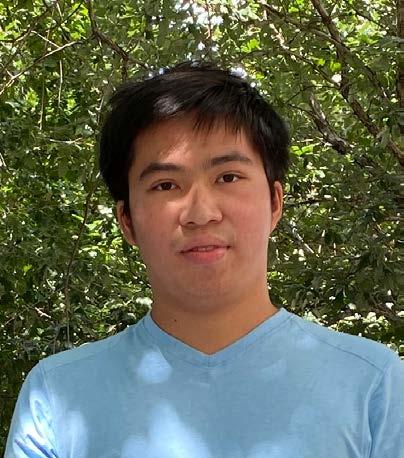
High Point University Business Administration

Rensselaer Polytechnic Institute Aeronautical Engineering
Alabama State University Computer Information Systems
CLARENCE “CHANCE” STEPHENS STEVEN RILEY JR. HENRY G. RODRIGUEZ CAMREN LITTLE JUSTIN GONG Baruch College Finance Journalism & Business Analysis DANTE MONTAQUE AMIYA CHISOLM JARED SHELLING

The African-American Chamber of Commerce of Pennsylvania, New Jersey, and Delaware honored lifelong Delaware County resident and INROADS Alumnus Steven S. Bradley at its annual meeting and awards ceremony at Lincoln Financial Field on Wednesday, Oct. 26, 2022.

Presented by Parx Casino and hosted by the Philadelphia Eagles, the 2022 event continued in its tradition of honoring business leaders in the region who represent and support African American businesses through economic empowerment and advocacy.
“I am honored to receive this distinguished award from AACC for my leadership during the past 13 years,” Bradley stated. “AACC’s membership has grown tremendously, building the next generation of civic, political, and business leaders, and most of all, creating jobs and wealth for Black and brown businesses in our region. AACC has become a significant resource and partner for political and civic foundations, which has benefited Black and brown businesses and the business and civic community during these challenging times. From my childhood and leadership training at First African Baptist Church, AACC has provided the legacy vehicle. I am full of gratitude for this outstanding recognition and to be able to continue the legacy of AACC.”
Marcus Robinson was recently named President of Markets for the Individual and Family plan business at UnitedHealthcare. “I am deeply grateful I get to continue working with an amazing team of people who are relentless in their pursuit to improve the lives of the individuals and families we serve,” said Robinson. “Thank you to all of my mentors, coaches, and champions who have invested in me.”

College Possible Milwaukee recently welcomed INROADS Alumnus Rick Dillon as its next board chair. Dillon is a Milwaukee native and an MPS alumnus, graduating from Rufus King High School. He is a cum laude graduate of Marquette University’s Honors Program and the College of Business Administration with a bachelor’s degree in accounting. Rick has an MBA from the Kellogg School of Management at Northwestern University. Among his many accolades and accomplishments, Rick has most recently been honored as the 2019 Milwaukee Business Journal’s CFO of the Year. He is currently the Senior Vice President and Chief Financial Officer for Aramark Uniform Services.

Happy

This Women’s History Month we celebrated the women of INROADS!
As historymakers in their own right, these dedicated professionals are passionate about creating opportunity for the young women that INROADS serves. Each shares a common commitment to helping young women of color break through glass ceilings and become future leaders who will go on to make history themselves, creating transformative impact in their careers and communities.
We asked the women of INROADS how they believe INROADS is helping women make history. Read their responses!







 Angela Alexander National Director
Angela Alexander National Director

“INROADS helps women make history by planting the seeds that we can make history; and by working to remove the barriers that suggest otherwise. INROADS has been a champion for over 50 years, striving to create and preserve diverse spaces. It has empowered young girls and women with courage, self-esteem, professionalism, poise, and presence. INROADS has created women leaders across the globe, and the best is yet to come!”
LaYauna Bonds




“There was a time when women didn’t have access to or the opportunity to work and now there are organizations such as INROADS that push for equality in the workplace and are constantly uplifting the next generation of future leaders!”


“Ultimately, we want to see more women have a voice and seat at the corporate table, as well as ethnically diverse high school and college students across the country as a whole. This is why we do what we do at INROADS and have for 50+ years!”
Kim Haynes Regional Programs Director“The professional training and development INROADS provides allows women to be competitive and prepared to thrive in corporate America. INROADS also provides them with opportunities they may not otherwise obtain in order to lay a solid foundation for their professional careers within major corporations!”



 Program Manager
Program Manager

“INROADS allows women and opportunities to flourish, ensuring that women have a voice and are in leadership positions throughout the organization.”
“INROADS creates a national platform for young women who look like us to see that women of color are leaders, are successful, and are committed to creating opportunities for them to do the same!”
“By showing up and showing out! In other words, making a positive impact by contributing to the mission of INROADS by putting our best foot forward.”
”The INROADS network provides examples of women who have done great things, which allow others to dream and dream bigger.”



“INROADS’ female staff members are empowered women who empower other young women!”

”By leveling the playing field for women entering corporate America and giving them the tools to lead and soar.”


INROADS Professionals (iPROS) connects you to top companies nationwide. With iPROS, INROADS Alumni receive support in their job search by periodically receiving entry level, mid-career and executive level job opportunities.
INROADS Professionals (iPROS) connects you to top companies nationwide. With iPROS, INROADS Alumni receive support in their job search by periodically receiving entry level, mid-career and executive level job opportunities.
INROADS Professionals (iPROS) connects you to top companies nationwide. With iPROS, INROADS Alumni receive support in their job search by periodically receiving entry level, mid-career and executive level job opportunities.
INROADS Professionals (iPROS) connects you to top companies nationwide. With iPROS, INROADS Alumni receive support in their job search by periodically receiving entry level, mid-career and executive level job opportunities.













Find your next career opportunity a entry-level, mid-career, and executive-level job opportunities.
Program Benefits
Program Benefits
Program Benefits
Access to full-time career opportunities in a variety of industries, nationwide

Access to full-time career opportunities in a variety of industries, nationwide. Resume review and interview preparation.
Resume review and interview preparation.
Program Benefits
Access to full-time career opportunities in a variety of industries, nationwide. Resume review and interview preparation.
Access to full-time career opportunities in a variety of industries, nationwide. Resume review and interview preparation.
Access to full-time career opportunities in a variety of industries nationawide.
If you are actively seeking new career opportunities, contact FLP@INROADS.org
If you are actively seeking new career opportunities, contact FLP@INROADS.org
If you are actively seeking new career opportunities, contact FLP@INROADS.org
INROADS.org/iPROS
If you are actively seeking new career opportunities, contact FLP@INROADS.org
INROADS.org/iPROS
INROADS alumni outperform national averages in wealth accumulation.

There are 36,000+ INROADS alumni in the alumni network.
96% of INROADS alumni feel INROADS impacted their career.



74% of INROADS alumni feel INROADS impacted promotions and career advancement.

ATLANTA CHAPTER
IRVING ROMAN, JR.
Senior Manager at EY
atlantaalumni@INROADS.org
CHARLOTTE CHAPTER
THESHA WOODLEY
Director of Alumni Engagement at Winston-Salem State University

charlottealumni@INROADS.org


DALLAS CHAPTER
CHRISTOPHER PLUMLEE
CEO/President at Catholic Charities, Fort Worth



dallasalumni@INROADS.org
HOUSTON CHAPTER
PERCILL GRIFFIN
Regulatory Audit Coordinator at Shell Exploration & Production
houstonalumni@INROADS.org
BOSTON CHAPTER
KHALID UMAR bostonalumni@INROADS.org
Senior Program Manager at BAE Systems
CHICAGO CHAPTER
JUSTIN COTTRELL
Senior Management Consultant at KPMG
chicagoalumni@INROADS.org
DC, MARYLAND, VIRGINIA CHAPTER
JOSETTE TOWLES
Head of Digital Business Transformation at BITHGROUP Technologies

midatlanticalumni@INROADS.org
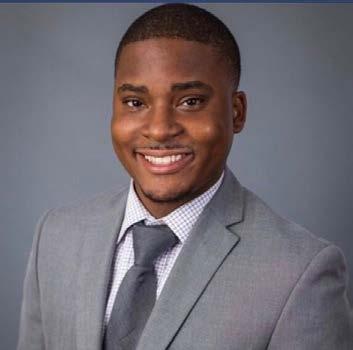
president. Can’t find your city listed below? Contact: alumnirelations@INROADS.org / 888-520-8691
NEW JERSEY CHAPTER
YUVI SINGH

Data Scientist at Slalom Consulting


newjerseyalumni@INROADS.org
orlandoalumni@INROADS.org
TAMPA CHAPTER
NIKKI GASKIN-CAPEHART

Senior Coach, The NGC Team Network of Gifted Consultants
tampaalumni@INROADS.org
NEW YORK CHAPTER
BENJAMIN LIOUE
Audit Manager at The Clearing House
nycalumni@INROADS.org

RALEIGH, DURHAM, CHAPEL HILL CHAPTER
DEWARREN LANGLEY
Principal Consultant & Chief Strategist at Solutions Consulting Services

nctrianglealumni@INROADS.org
WISCONSIN CHAPTER
DALE GILLIAM
President at GBG Insurance Agency
wisconsinalumni@INROADS.org
